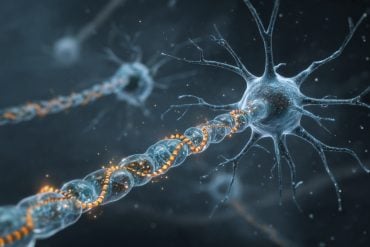Summary: Changing your sleep schedule by one hour has a significant impact on risk factors for major depression. Going to sleep and waking one hour earlier than usual was associated with a 23% decreased risk of developing depressive disorders.
Source: University of Colorado
Waking up just one hour earlier could reduce a person’s risk of major depression by 23%, suggests a sweeping new genetic study published May 26 in the journal JAMA Psychiatry.
The study of 840,000 people, by researchers at University of Colorado Boulder and the Broad Institute of MIT and Harvard, represents some of the strongest evidence yet that chronotype–a person’s propensity to sleep at a certain time –influences depression risk.
It’s also among the first studies to quantify just how much, or little, change is required to influence mental health.
As people emerge, post-pandemic, from working and attending school remotely– a trend that has led many to shift to a later sleep schedule–the findings could have important implications.
“We have known for some time that there is a relationship between sleep timing and mood, but a question we often hear from clinicians is: How much earlier do we need to shift people to see a benefit?” said senior author Celine Vetter, assistant professor of integrative physiology at CU Boulder. “We found that even one-hour earlier sleep timing is associated with significantly lower risk of depression.”
Previous observational studies have shown that night owls are as much as twice as likely to suffer from depression as early risers, regardless of how long they sleep. But because mood disorders themselves can disrupt sleep patterns, researchers have had a hard time deciphering what causes what.
Other studies have had small sample sizes, relied on questionnaires from a single time point, or didn’t account for environmental factors which can influence both sleep timing and mood, potentially confounding results.
In 2018, Vetter published a large, long term study of 32,000 nurses showing that “early risers” were up to 27% less likely to develop depression over the course of four years, but that begged the question: What does it mean to be an early riser?
To get a clearer sense of whether shifting sleep time earlier is truly protective, and how much shift is required, lead author Iyas Daghlas, M.D., turned to data from the DNA testing company 23 and Me and the biomedical database UK Biobank. Daghlas then used a method called “Mendelian randomization” that leverages genetic associations to help decipher cause and effect.
“Our genetics are set at birth so some of the biases that affect other kinds of epidemiological research tend not to affect genetic studies,” said Daghlas, who graduated in May from Harvard Medical School.
More than 340 common genetic variants, including variants in the so-called “clock gene” PER2, are known to influence a person’s chronotype, and genetics collectively explains 12-42% of our sleep timing preference.
The researchers assessed deidentified genetic data on these variants from up to 850,000 individuals, including data from 85,000 who had worn wearable sleep trackers for 7 days and 250,000 who had filled out sleep-preference questionnaires. This gave them a more granular picture, down to the hour, of how variants in genes influence when we sleep and wake up.
In the largest of these samples, about a third of surveyed subjects self-identified as morning larks, 9% were night owls and the rest were in the middle. Overall, the average sleep mid-point was 3 a.m., meaning they went to bed at 11 p.m. and got up at 6 a.m.
With this information in hand, the researchers turned to a different sample which included genetic information along with anonymized medical and prescription records and surveys about diagnoses of major depressive disorder.
Using novel statistical techniques, they asked: Do those with genetic variants which predispose them to be early risers also have lower risk of depression?
The answer is a firm yes.
Each one-hour earlier sleep midpoint (halfway between bedtime and wake time) corresponded with a 23% lower risk of major depressive disorder.
This suggests that if someone who normally goes to bed at 1 a.m. goes to bed at midnight instead and sleeps the same duration, they could cut their risk by 23%; if they go to bed at 11 p.m., they could cut it by about 40%.
It’s unclear from the study whether those who are already early risers could benefit from getting up even earlier. But for those in the intermediate range or evening range, shifting to an earlier bedtime would likely be helpful.
What could explain this effect?
Some research suggests that getting greater light exposure during the day, which early-risers tend to get, results in a cascade of hormonal impacts that can influence mood.

Others note that having a biological clock, or circadian rhythm, that trends differently than most peoples’ can in itself be depressing.
“We live in a society that is designed for morning people, and evening people often feel as if they are in a constant state of misalignment with that societal clock,” said Daghlas.
He stresses that a large randomized clinical trial is necessary to determine definitively whether going to bed early can reduce depression. “But this study definitely shifts the weight of evidence toward supporting a causal effect of sleep timing on depression.”
For those wanting to shift themselves to an earlier sleep schedule, Vetter offers this advice:
“Keep your days bright and your nights dark,” she says. “Have your morning coffee on the porch. Walk or ride your bike to work if you can, and dim those electronics in the evening.”
About this depression research news
Source: University of Colorado
Contact: Lisa Marshall – University of Colorado
Image: The image is in the public domain
Original Research: Closed access.
“Genetically Proxied Diurnal Preference, Sleep Timing, and Risk of Major Depressive Disorder” by Celine Vetter et al. JAMA Psychiatry
Abstract
Genetically Proxied Diurnal Preference, Sleep Timing, and Risk of Major Depressive Disorder
Importance
Morning diurnal preference is associated with reduced risk of major depressive disorder (MDD); however, causality in this association is uncertain.
Objective
To examine the association of genetically proxied morning diurnal preference with depression risk using mendelian randomization.
Design, Setting, and Participants
This 2-sample mendelian randomization study used summary-level genetic associations with diurnal preference and MDD. Up to 340 genetic loci associated with diurnal preference in a meta-analysis of the UK Biobank and 23andMe cohorts were considered as genetic proxies for diurnal preference. The effect size of these variants was scaled using genetic associations with accelerometer-based measurement of sleep midpoint.
Genetic associations with MDD were obtained from a meta-analysis of genome-wide association studies data from the Psychiatric Genomics Consortium and UK Biobank. The inverse-variance weighted method was used to estimate the association of genetically proxied morning diurnal preference, corresponding to a 1-hour earlier sleep midpoint, with MDD risk.
Exposures
Morning diurnal preference scaled to a 1-hour earlier, objectively measured sleep midpoint.
Main Outcomes and Measures
Risk of MDD, including self-reported and clinically diagnosed cases, as ascertained in meta-analyses of genome-wide association studies.
Results
A total of 697 828 individuals (all of European ancestry) were in the UK Biobank and 23andMe cohorts; 85 502 in the UK Biobank had measurements of the sleep midpoint. A further 170 756 individuals with MDD and 329 443 control participants (all of European ancestry) were in the Psychiatric Genomics Consortium and UK Biobank data. Genetically proxied earlier diurnal preference was associated with a 23% lower risk of depression (odds ratio [OR] per 1-hour earlier sleep midpoint, 0.77 [95% CI, 0.63-0.94]; P = .01).
This association was similar when restricting analysis to individuals with MDD as stringently defined by the Psychiatric Genomics Consortium (OR, 0.73 [95% CI, 0.54-1.00]; P = .05) but not statistically significant when defined by hospital-based billing codes in the UK Biobank (OR, 0.64 [95% CI, 0.39-1.06]; P = .08). Sensitivity analyses examining potential bias due to pleiotropy or reverse causality showed similar findings (eg, intercept [SE], 0.00 [0.001]; P = .66 by Egger intercept test).
Conclusions and Relevance
The results of this mendelian randomization study support a protective association of earlier diurnal preference with risk of MDD and provide estimates contextualized to an objective sleep timing measure. Further investigation in the form of randomized clinical trials may be warranted.







